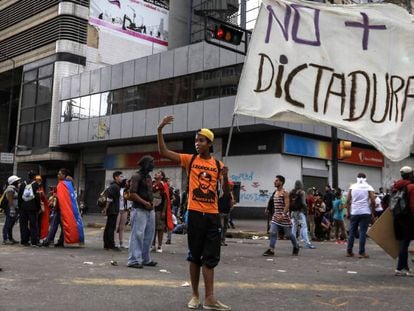The failure of Venezuela’s ‘cultural revolution’
Suspension of literary award and cancellation of youth orchestra tour highlight crisis in sector

In 1980, the Argentinean writer and journalist Tomás Eloy Martínez was one of the many intellectuals who arrived in the Venezuelan capital of Caracas attracted by the opportunities in the South American country then known as “Venezuela Saudita” (Saudi Venezuela) because it was awash with petrodollars.
When asked if it was a cultured place, he responded: “In conventional terms, yes. There are six large concert halls that are always full of people; four elite museums and a dozen smaller museums devoted to safeguarding national memory; seven universities and around 10 institutes of higher education; six symphony orchestras, more than 20 theaters, and a Babylonian festival – the best in the world.”
The fortunes of the literary prize are symptomatic of the South American country’s problems
Several decades later and after a long history of government crises – which have intensified since the election of Nicolás Maduro in 2013 – there is little left of the country that seduced artists in the 1940s and 1950s, including the Cuban writer Alejo Carpentier, the young journalist Gabriel García Márquez, the great Uruguayan literary critic Ángel Rama, as well as a couple of decades later Tomás Eloy Martínez himself.
This year, Venezuelan cultural institutions have experienced serious signs of decay: first with the announcement in June that due to lack of funds the Ministry of Culture had suspended the Rómulo Gallegos literary prize – the most important in the region. Then in August came the cancellation of a tour of the United States for the famous Youth Orchestra of Venezuela, directed by Gustavo Dudamel.
Maduro accused the musician of playing politics after he criticized the death of a young violinist during the wave of anti-government protests that left 120 dead and hundreds wounded.

The Rómulo Gallegos prize, which in its best years celebrated the work of Mario Vargas Llosa, Gabriel García Márquez, and Mexico’s Carlos Fuentes, had shown first signs of concern in 2015 when the winner, Colombian writer Pablo Montoya, had to wait over six months to receive the $100,000 award. “There are prizes without monetary reward, like the Prix Goncourt in France. The writer receives almost nothing, just a check of one or ten euros, but is instead offered spectacular exposure that guarantees that the writer gets a large financial reward,” says Montoya in an email about the decision not to hand out the prize this year. “The Rómulo Gallegos could do something similar, but the crisis in Venezuela makes that impossible at the moment. It is a country, that to a certain extent, has gone down the drain,” says the writer.
Roberto Hernández, president of the institution responsible for the prize, admits that they have considered adopting the symbolic incentive model of the Goncourt, although “only informally.” With projected inflation of 2,200% for this year and a 7.4% drop in GDP, according to the International Monetary Fund, coupled with Washington’s ban on buying bonds from the Venezuelan government and the state-owned oil company PDVSA, the literary prize seems to be the least of the South American country’s problems. But it is a clear symptom of the economic crisis.
Despite the decline of various art institutions, Chavism (the political ideology tied to former Venezuelan president Hugo Chavez) aimed to expand access to culture in a country where it was a middle and upper classes privilege. In 2007, Chavez opened a printing press that could produce 60,000 books, magazines and newspapers daily. According to the Ministry of Culture, this institute alone has since published 11 million works.
Chavism is contradictory because the state and the market try to both limit and increase access to culture
But Venezuela ranks ninth in Latin America in terms of the number of publications it produces. In addition, the percentage of readers in the country barely increased by two points between 2008 and 2012 – the latest comparable data available – and that despite costly state investment, according to Venezuelan researcher Gisela Kozak.
Journalist Manuel Silva-Ferrer, a research associate at the Institute of Latin American Studies at the Free University of Berlin, points out in his book El cuerpo dócil de la cultura (The Docile Body of Culture) that Chavist ideology is contradictory because the state and the market have imposed restrictions that try to both limit and increase access to culture. Many intellectuals have also migrated from the public to the private sector, in “a phenomenon characteristic of totalitarian regimes,” says Silva-Ferrer in a phone interview.
This is precisely what happened with the National System of Orchestras, a successful government musical training program from which more than 300,000 children, mostly underprivileged, benefit. “Certainly, the degree of political control over the system has increased markedly, although this is hardly visible since its position has always been to avoid any political declarations and tacitly align itself with any party or politician in power. That’s the reason why it has hardly been silenced,” says Geoffrey Baker, Professor of Music at the University of London.
In addition to the canceled United States tour, Venezuela’s Simón Bolívar Symphony Orchestra also put on hold a series of concerts in July in Bogota. Baker says: "If the system is closely linked to the decline of Chavism, it is because it was tied to this during the better days of high oil prices and the popularity of the government. And 10 years ago, the world loved them.”
English version by Debora Almeida.












































